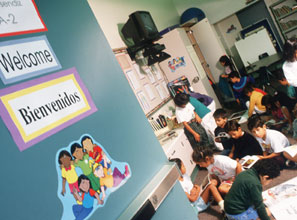Univision to Launch English-Language Television Network
06/10/2012
The decision of a major Spanish-language network in America to broadcast on a new English-language platform is quite the reversal of accepted liberal opinion.
We have been told for decades that sensitive Hispanics require the comfy reassurance of their mother tongue to receive any information at all, or they would be deeply insulted. As a result of liberal and Raza-tarian insistence, we have seen the insinuation of the Spanish language throughout American society, but particularly where Hispanic infiltration has been thick. Celebrating diversity means promoting Babel, right?
Network honchos now believe that presumably acculturated Hispanics have other interests than the concerns common to newbies.
Below, “bilingual” instruction for all kids (teaching Spanish, not French or German) has become the goal for many educators.

But apparently some Hispanics who have been here a while (generations?) are more comfortable with English, something that expert broadcasters and advertisers have noticed, as this story illustrates.
Meanwhile, on the other side of the looking glass, Fox News is about to start up its Spanish-language network, MundoFox, slated for a fall rollout.
Fox is going backwards, no?
Univision in English? Finally It Gets in Step With the Hispanic Market; Trends Show that Spanish Is Not the Best Way to Reach Most U.S. Latinos, Ad Age, by Edward T. Rincon, June 8, 2012
It must not have been an easy decision for Univision, the Spanish-language media giant, to join ABC in creating an English-language TV network and digital platform aimed at U.S. Latinos. Why? Because it departs sharply from Univision’s long-standing position that Spanish is the best way to communicate with Hispanics in this country.
As described by Cesar Conde, president of Univision Networks, the joint venture is “an extension of our vision to deliver the most relevant news and information, regardless of language, to all Hispanics.” The new network will have anchors and correspondents in major U.S. cities from Univision and ABC. Although Conde appears to minimize the importance of language, programming in English marks a major change in Univision’s strategy.
For some time, the idea that Spanish is the route to the Hispanic market has been firmly etched in the minds of U.S. advertisers, with some Spanish-language advocates making effective emotional appeals about the virtues of the Spanish-language with slogans like “Spanish is the language of the heart” and “We make love in Spanish.”
Media-ratings companies added to the Spanish-language case by omitting country of birth in their ratings, which could have shown marked differences in the television viewing habits of native and foreign-born Hispanics. The economic payoff for Univision and the Spanish-language media industry has been huge: an estimated 90 percent of all advertising dollars directed to U.S. Hispanics are delivered in Spanish.
So why would Univision want to change its formula for success?
First, does it make sense to invest 90 percent of advertising dollars into Spanish-language media when 63 percent of U.S. Hispanics are native-born and primarily use English-language media? This is not a new trend, and is supported by numerous independent studies of U.S. Hispanics. And it will come to be reflected in television ratings, as the ratings companies, in response to litigation and protests by community and industry groups, break down Hispanic viewers by country of birth.
Secondly, the proportion of Hispanic immigrants in the United States is actually shrinking. While 40.2 percent of U.S. Hispanics in 2000 were foreign-born, this percentage decreased to 37.1 percent in 2010. In California — home to 14 million Hispanics — the percentage of the foreign-born dropped from 43.9 percent to 38.2 percent. Even more compelling is a recent study finding by the Pew Hispanic Center (2012) that net migration flow from Mexico to the United States has stopped and may have reversed –- an outcome of factors like a weakened U.S. economy, increased border enforcement and a rise in deportations.
Thirdly, Univision has probably come to acknowledge that not all U.S. Hispanics want a steady diet of novelas, game shows and international news — programming that appeals primarily to Hispanic immigrants. The audience for the new network will likely be composed primarily of native-born, English-speaking Hispanics who will want to see programming that is relevant to their experience in the United States.
Although Univision and ABC appear committed to expanding the variety of programming offered by the new network, it will take considerable effort to ensure that this actually happens. For example: Will decisions about content be made with community input from U.S. Hispanics? Will there be efforts to include Latinos as anchors or reporters who do not fit the blonde, blue-eyed profile of both networks?
There is also a lingering question for Univision. What explanation is the company prepared to give to advertisers who have been accustomed to hearing that Spanish was the most effective vehicle for communicating with U. S. Hispanics? Is Univision willing to concede that its past research and recommendations were incorrect and potentially misleading? Advertisers deserve some explanation.
The proposed network offers great potential for providing English-speaking Hispanics with a wider variety of programming. It is also an opportunity to build knowledge about U.S. Latinos in the English-speaking, non-Latino audience, as well as in the Latino audience itself. This becomes significant because future Latino growth will be driven primarily by the children of immigrants, who are primarily English-speaking and are less likely to to know about their culture. Let us hope that the proposed network fulfills its ambitious goals and does not disappoint the underserved English-speaking Hispanic audience.
